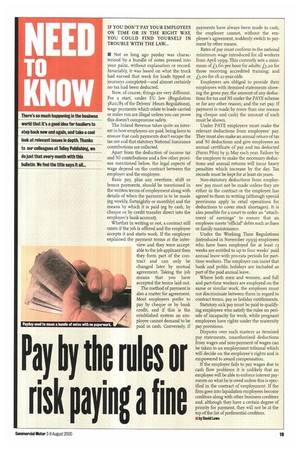Pay by the rules or
Page 21

If you've noticed an error in this article please click here to report it so we can fix it.
risk paying a fine
IF YOU DON'T PAY YOUR EMPLOYEES ON TIME OR IN THE RIGHT WAY, YOU COULD FIND YOURSELF IN TROUBLE WITH THE LAW...
• Not so long ago payday was characterised by a bundle of notes pressed into your palm, without explanation or record. Invariably, it was based on what the truck had earned that week for loads tipped or journeys completed—and almost certainly no tax had been deducted.
Now, of course, things are very different. For a start, under EU law (Regulation 3820/85 of the Drivers' Hours Regulations), wage payments which relate to loads carried or miles run are illegal unless you can prove this doesn't compromise safety.
The Inland Revenue takes quite an interest in how employees are paid, being keen to ensure that cash payments don't escape the tax net and that statutory National Insurance contributions are collected.
Apart from the deduction of income tax and NI contributions and a few other provisos mentioned below, the legal aspects of wage depend on the contract between the employer and the employee.
Basic pay, plus any overtime, shift or bonus payments, should be mentioned in the written terms of employment along with details of when the payment is to be made (eg weekly, fortnightly or monthly) and the means by which it is paid (eg by cash, by cheque or by credit transfer direct into the employee's bank account).
Whether in writing or not, a contract still exists if the job is offered and the employee accepts it and starts work. If the employer explained the payment terms at the interview and they were acceptable to the job applicant then they form part of the contract and can only be changed later by mutual agreement. Taking the job means that you have accepted the terms laid out.
The method of payment is also a matter for agreement. Most employers prefer to pay by cheque or by bank credit, and if this is the established system an employee cannot demand to be paid in cash. Conversely, if payments have always been made in cash, the employer cannot, without the employee's agreement, suddenly switch to payment by other means.
Rates of pay must conform to the national minimum wage introduced for all workers from April 1999. This currently sets a Minimum of 3.6o per hour for adults; Z3.2o for those receiving accredited training; and f3.00 for 18-zi-year-olds.
Employers are obliged to provide their employees with itemised statements showing the gross pay; the amount of any deductions for tax and NI under the PAYE scheme or for any other reason; and the net pay. If payment is made by more than one means (eg cheque and cash) the amount of each must be shown.
Under PAYE employers must make the relevant deductions from employees' pay. They must also make an annual return of tax and NI deductions and give employees an annual certificate of pay and tax deducted (Form P6o) by 31 May each year. Failure by the employer to make the necessary deductions and annual returns will incur heavy penalties which increase by the day. Tax records must be kept for at least six years.
Non-statutory deductions from employees' pay must not be made unless they are either in the contract or the employee has agreed to them in writing (although special provisions apply in retail operations for deductions to cover stock shortages). It is also possible for a court to order an "attachment of earnings" to ensure that an employee meets "official" debts such as fines or family maintenance.
Under the Working Time Regulations (introduced in November 1999) employees who have been employed for at least r3 weeks are entitled to up to four weeks' paid annual leave with pro-rata periods for parttime workers. The employer can insist that bank and public holidays are included as part of the paid annual leave.
Where both men and women, and full and part-time workers are employed on the same or similar work, the employer must not discriminate between them in regard to contract terms, pay or holiday entitlements.
Statutory sick pay must be paid to qualifying employees who satisfy the rules on periods of incapacity for work, while pregnant employees have rights under the maternity pay provisions.
Disputes over such matters as itemised pay statements, unauthorised deductions from wages and non-payment of wages can be taken to an employment tribunal which will decide on the employee's rights and is empowered to award compensation.
If the employer fails to pay wages due to cash flow problems it is unlikely that an employee will be able to enforce interest payments on what he is owed unless this is specified in the contract of employment. If the firm goes into liquidation employees become creditors along with other business creditors and, although they have a certain degree of priority for payment, they will not be at the top of the list of preferential creditors.
• by David Lowe




































































































